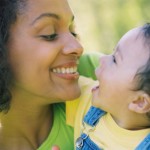New study shows that babies learn language best from speakers that sound like their caregivers.

The study, “You sound like Mommy: Bilingual monolingual infants learn words best from speakers typical of their language environments” by Christopher Fennell and Krista Byers-Heinlein took groups of monolingual English and bilingual French-English 17-month-olds and tested their ability to learn new words. The researchers grouped some monolingual babies with monolingual speakers, some bilingual babies with bilingual speakers, and then also had groups of monolingual babies with bilingual speakers and bilingual babies with monolingual speakers. Using a minimal pair test, because distinguishing phonemes is challenging as babies develop language, the researchers assessed the babies’ abilities to learn new words. The result was that the monolingual babies usually couldn’t learn from bilingual adults and bilingual babies usually couldn’t learn from monolingual adults. The study shows that it isn’t just the language spoken at home that matters, but who the other speakers at home are. For example, bilingual babies of a parent who was raised monolingual but that acquired another language to become bilingual could learn from the monolingual speaker.
The study explained that bilingual speakers have an accent in both languages that they speak, which is not detectable among adults, but that a child acquiring language can detect. Ultimately, children learn language best from the speakers who “sound like Mommy,” while all the participating infants had difficulty processing minimal pair words when listening to the speaker whose language did not match their home language-learning environment. Neither monolingual nor bilingual babies had an advantage.
The findings present interesting implications for researchers who study infants and language acquisition: if the speakers in a study don’t sound like the caregivers in the baby’s home environment, the results may differ from scenarios in which the speakers do have the same accent as the caregivers. All babies, whether monolingual or multilingual, are highly attuned to their home language environments.


